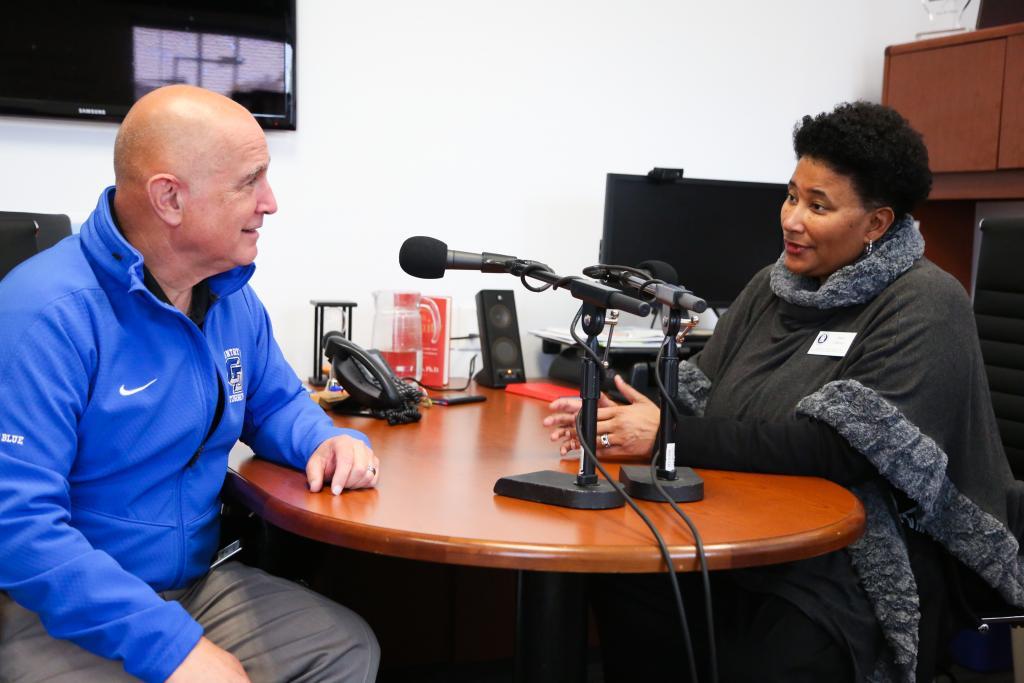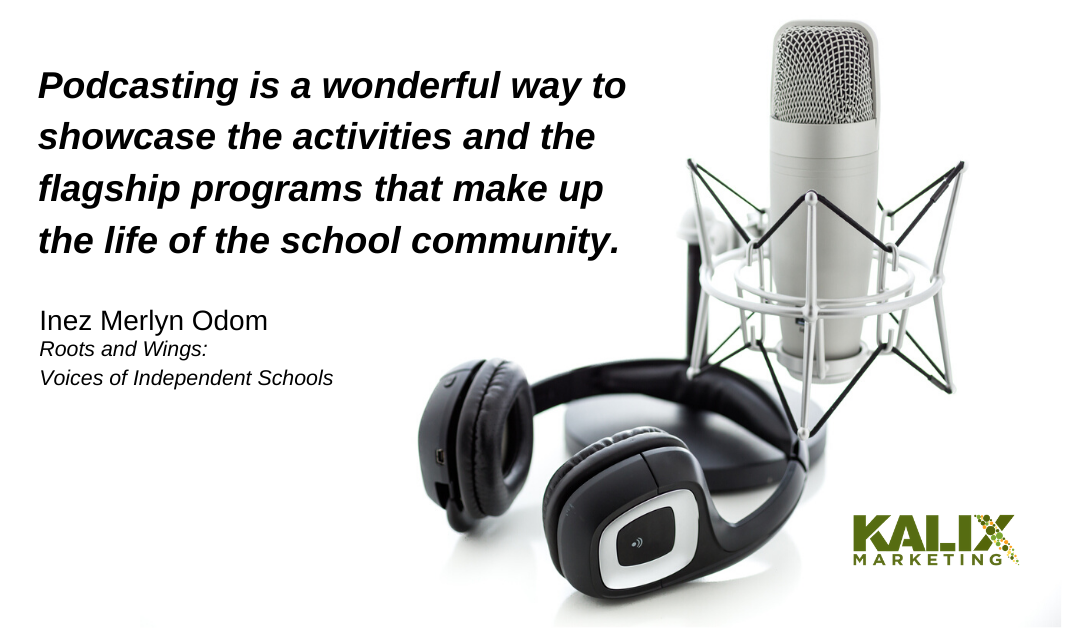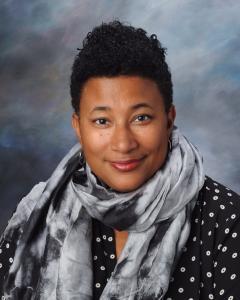Podcasts are a great, strategic way to share your school’s messaging with internal and external communities.
Kalix talked to Inez Merlyn Odom, host, writer and producer of Roots and Wings: Voices of Independent Schools, the podcast of La Jolla Country Day School (CA), where Odom has served as assistant head of school for enrollment management and outreach for the past ten years. Through the podcast, she explores issues of relevance in independent school education ranging from testing and assessments to the role of the board of trustees.
In this interview, she shares tips on creating and sustaining a podcast, as well as the need to always keep the school’s mission and message firmly in mind.
Kalix: Why did you create Roots and Wings?
Odom: I realized that there are questions parents have that really demand longer conversations. I wanted to access a platform that would let parents engage and think about a topic on their schedule.
I had my own multimedia production company [prior to joining the staff at La Jolla Country Day School]. I had law enforcement clients and had to take on very complex issues and make them accessible. For me, the intention with the podcast was, if I were a parent listening to a conversation, what would I want to know. The first episode was really and back and forth on the independent school admissions process with my colleague Brian Murphy, who is the Director of Financial Assistance and Enrollment Management. My driving goal was to create topics of interest for our parents. My next goal is search engine optimization.
Kalix: What are the marketing and retention benefits to creating a school podcast?
Odom: There is often misinformation and misperceptions within independent schools. We use our podcast to clarify points of concern. It is also a wonderful way to showcase the activities and the flagship programs that make up the life of the school community.
Having a dialogue with people at the school and having a conversation on a platform that someone can listen to on their exercise bike are key. How do we speak adult to adult? We have to have a forum where you can hear from experts in depth. Parents often want in depth information. As much as we want to read a Tweet or post, many parents want to sit down and listen. From a retention perspective, there is a better way. A podcast allows you to edit your answer and be intentional.
Kalix: What are the best-practice tips for podcasting?
Odom: I am a big believer in paying for expertise. There are a lot of people who can teach you to podcast from a technical perspective, but I bring in a professional sound engineer who records the podcasts digitally. We have very sophisticated listeners and viewers. Spend the money so your technical quality is not compromised. You can build a relationship with your local PBS station and hire someone with technical expertise.
This has been a passion project for me. My sound technician is a friend who gave me the “family discount.” I am fortunate to have a master’s degree in communications. A skilled interviewer is the key to providing an engaging podcast. You need a professional who speaks the independent school language. You could find someone in your community who has the skill set to be a good interviewer or hire a professional interviewer. For our podcast, I am the host because I want there to be a level of professionalism and consistency.
In some instances, the interviewer is merely the guide to the person listening to the podcast. What matters are the responses being given and the content being shared. And realistically, it is unlikely that the head of school has time to host a podcast.
Use professional elements, too. We have a generic “tease” that takes the listener into the podcast and use musical introductions, too. We have created a podcast that has a higher production value.
I have the most wonderful director of marketing and communication, Tiffany Truong, on the face of the earth, who has helped me strategize about our content. We’ve shifted to not just being about La Jolla Country Day School, but also interviewing colleagues in independent school leadership around the country.
We are creating a marketing plan for how we are going to message out the podcasts. Right now, we are using the podcasts for new and prospective families and not aggressively marketing them to our larger constituency, but we are shifting to that. Now, we are putting them in our emails to parents, alumni and our school newsletters. When the NAIS article on our podcast came out last summer, we sent an invitation to our community to subscribe to the podcast.
One of our goals is to increase lower school enrollment, so we have sponsored the local museum, the New Children’s Museum in San Diego. I interviewed the museum leadership (episode #19), and the museum put it on their website. This has provided us with a cross promotion opportunity.

Kalix: How do you develop content?
Odom: I’ve interviewed our head of school and the directors of our two centers of excellence. Many of the podcast topics were simply things that intrigued me. Determining topics has been fairly intuitive. What are your differentiators at your school? Your podcast should talk about and feature those differentiators.
Many schools have a speaker series. If your school has already paid for a speaker to come to campus, pre-negotiate to have that person record a podcast. You can interview alumni and students, too – the possibilities are endless.
In episode #13, I have seven alumni talk about their school experiences. They already were on campus to call applicant families – that was an extremely effective way to engage with prospective families – and I asked them to spend ten minutes talking to be for the podcast.
Kalix: What do you wish you knew before you began your podcast?
Odom: Make sure that the sound professional (or someone else) takes a photo of each podcast as you are doing it. It’s important to memorialize what you are doing. It’s part of the life of your school.
Do your homework before you interview someone. Rapport is very important, too. About 90% of the people I’ve podcasted with are those with whom I have had a relationship. My hope is that you can hear it in the conversation. During the interviews, I made a conscious choice to have verbal validations as the interviewee is speaking, such as “Yes,” or “I see.” I have done this to create rapport.
As far as budgets go, I have spent about $5,000 on 20 episodes because I work with a former colleague who has given me a big discount for sound editing. A podcast series should cost anywhere from $10,000 to more than $20,000 annually. You need to think about how you are going to budget for this, so that you can keep it going.
There may be some bold schools who have juniors and seniors conducting interviews. You can shape this however you want to. If a school were really smart and had no budget, they’d do a guerrilla podcast and allow the real sounds of the school be part of the texture of the podcast, communicating to their audience up front that the audio is authentic. You can be a little playful with this structure.
About Roots and Wings: Voices of Independent Schools
Odom decided to create the popular podcast, Roots and Wings: Voices of Independent Schools, in 2018 to provide parents and other La Jolla Country Day School community members a resource to delve more deeply into the many questions they had about independent schools. She launched the series, which is available on iTunes, Spotify and the school’s website, with ten episodes. Today, there are more than 30 episodes available with a dozen more ready for publishing.
A veteran interviewer and broadcast media expert, Odem interviews La Jolla Country Day School administrators and faculty, as well as independent school leaders across the country. In summer 2019, NAIS magazine featured the podcast.
 About Inez Merlyn Odom
About Inez Merlyn Odom
As the assistant head of school for enrollment management and outreach, Inez Merlyn Odom oversees the strategic initiatives for the admission and marketing and communications departments for La Jolla Country Day School.
With a master’s degree in communications from Stanford University, Odom has implemented progressive initiatives for the office of admission, including state-of-the-art project and student management software, innovative strategies for re-recruitment and student ambassador programs. She oversees the practical and experiential aspects of the admission process to ensure that applicants are treated with dignity, fairness and kindness. She also works closely with her fellow leadership team members to verify that students and their families have a meaningful and positive experience. She would be delighted to work with independent schools around the country to help them shape their podcasts, either as a producer, host or both.


